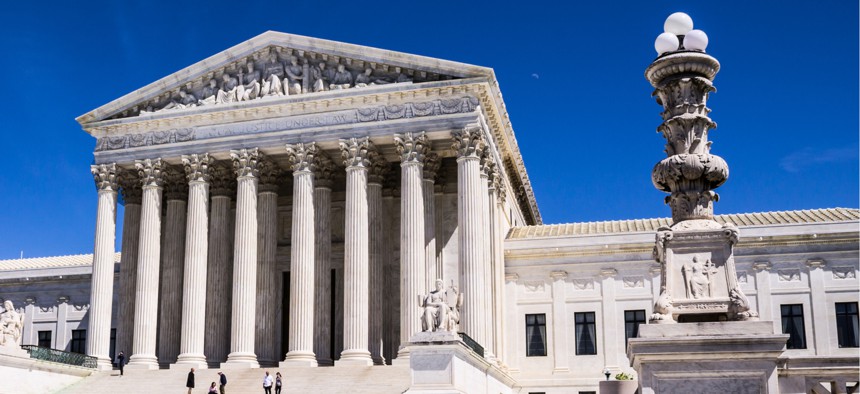Will the Supreme Court Deliver a Windfall of Tax Revenue for State Governments?

The U.S. Supreme Court Building Shutterstock
Justices on the high court plan to examine the federal ban on sports betting outside of Nevada.
Odds jumped last week that state governments might soon win the right to tap into the country’s $150 billion-a-year black market in sports betting.
On Tuesday the U.S. Supreme Court announced it will take up a New Jersey case that challenges the federal law banning sports betting outside of Nevada.
New Jersey passed laws in 2012 and 2014 meant to allow sports betting at state casinos and racetracks. But the top national sports leagues—the NBA, NCAA, NFL, NHL and MLB—responded by suing Gov. Chris Christie, tying up the laws in court. The Supreme Court decision to take up a New Jersey appeal broke a string of legal setbacks for the Garden State and may signal a shift in momentum. As ESPN reported, a Supreme Court victory for New Jersey could well “jump-start a state-by-state expansion across the nation.”
Indeed, even with the ban still in place, lawmakers in at least seven states—Connecticut, Maryland, Michigan, New York, Pennsylvania, South Carolina and West Virginia—introduced sports betting legislation this year.
"The fact that the Supreme Court granted cert in this case is a very good sign," Christie said last week. "We're not declaring victory, but at least we're in the game, and that's where we want to be."
The case centers around the 1992 Professional and Amateur Sports Protection Act (PASPA), which has given Nevada its effective monopoly on single-game sports betting.
Gaming companies mostly oppose the law and this month they joined with states rights advocates to form the American Sports Betting Coalition to push the high court to take up New Jersey’s appeal.
The American Gaming Association estimates that Americans wagered $4.1 billion on this year’s Super Bowl, that they will bet $90 billion on professional and college football this season, and that 98 percent of all of those bets will be made on the black market.
The association says current law translates to vast sums in lost tax revenue. The group filed an amicus brief to the Supreme Court last year laying out its arguments.
[R]eplacing PASPA’s top-down mandate with state-by-state regulation will benefit consumers, law enforcement, professional and amateur sports, and local communities.
First, and most importantly, experience in Nevada and other nations shows that regulated sports-betting markets all-but eliminate illegal sports gambling.
Second, transitioning to regulated markets enables states to protect citizens who wager on sports, using consumer protection laws and other measures designed to prevent exploitation and abuse.
Third, law enforcement can use the data and revenue generated by regulated sports betting to prevent and investigate corruption (such as matchfixing).
Fourth, regulating sports betting will allow states to generate tax and tourism revenue to fund law enforcement, social services, and other matters of vital concern to States and local communities.
“When presented with a safe, legal market or an illicit alternative, consumers will almost always choose the former,” the authors of the brief wrote.
ESPN reports that Congress is currently considering draft legislation aimed at repealing the ban on state-based sports betting, and that the NBA and the MLB have “pivoted” away from their hardline support for the ban.
John Tomasic is a journalist who lives in Boulder, Colorado.
NEXT STORY: Why States Are Struggling to Tax Services





